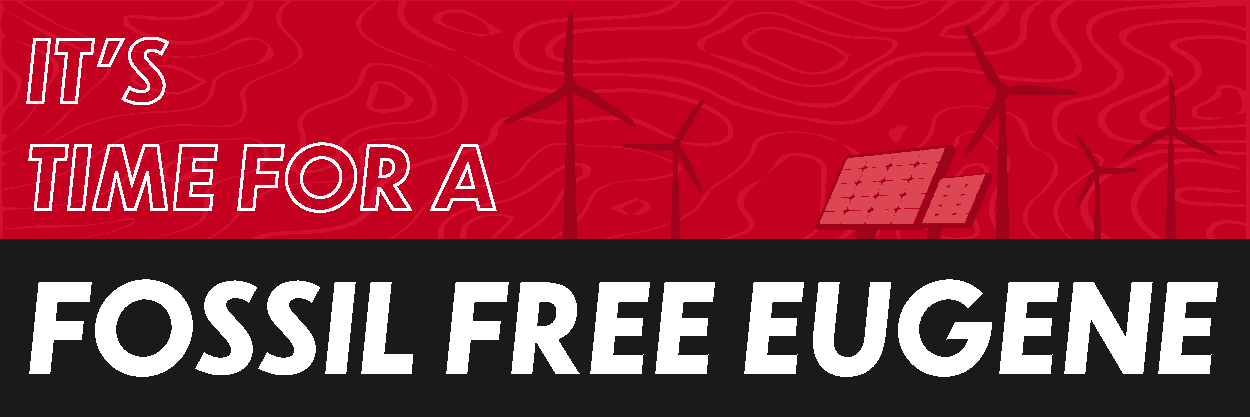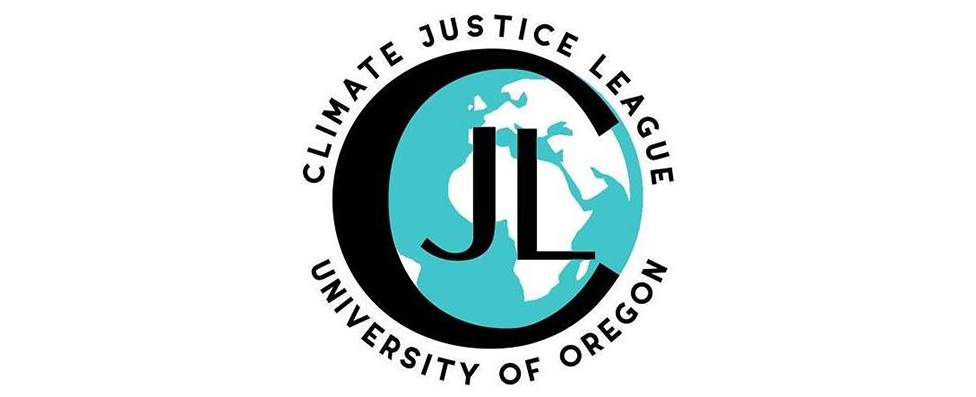
Fossil Free Eugene is a Coalition
In 2014, the city of Eugene passed the Climate Recovery Ordinance (CRO) with bold targets to reduce our consumption of fossil fuels and prevent catastrophic climate change. Now, more than six years later, the city has done little to ensure that these goals are met. As the climate crisis continues to worsen, and our local community is impacted by climate-driven wildfires and drought, it is time for the city to act.
Fossil Free Eugene is a coalition of grassroots organizations calling on the City of Eugene to follow through with the goals that it set for itself, and lead the way to forging a just transition away from fossil fuels for all of its residents.
We are calling on the city of Eugene to take immediate action to reduce our reliance on fossil fuels by:
- Facilitating a just transition for frontline and historically marginalized communities by:
- providing trainings and resources to increase the accessibility of Inflation Reduction Act funds and other local, state, and national subsidies
- working with utilities to reduce energy burden
- Identifying additional funding streams to support whole home retrofits for historically marginalized groups beyond the capacity of the IRA programs
- Mandating that new construction in Eugene be built all-electric
- Transitioning all utilities in the City to 100% renewable energy by 2030
Not only are these steps necessary to prevent the worst impacts of the climate crisis, but they will greatly reduce the risks to health and safety posed to our community by fracked gas and other fossil fuels, and save us money all the while.
A recent study showed that children who grow up in households with a gas stove have a 42% higher chance of developing asthma symptoms. A UCLA study showed that exhaust from gas appliances produces carbon monoxide and nitrogen dioxide exposures that exceed national and California standards in 90% of the homes modeled.
Additionally, an immediate ban on new fossil fuel infrastructure would actually save the city and its residents money. An analysis by the Rocky Mountain Institute showed that the West Coast cities of Oakland and Seattle would both save large sums by mandating a transition away from fossil fuel hookups for homes and buildings.
- So-called “natural gas” is a fossil fuel that releases carbon dioxide when it’s burned. In the U.S., more carbon pollution now comes from gas than coal. Three quarters of gas nationwide now comes from the environmentally destructive process of hydraulic fracturing or “fracking,” in which water and chemicals are injected into the ground, leading to earthquakes and putting drinking water at risk.
- As gas is extracted at fracking wells and transported through miles of pipelines, there are frequent releases of methane, a greenhouse gas 84 times more potent than carbon dioxide. Total methane pollution across U.S. gas operations impacts climate change as much as the annual tailpipe emissions from about 70 million cars.
- Homes and buildings consume nearly 43% of all energy in Oregon and cause about one-third of [the] state’s climate pollution—the second largest source of climate pollution after the transportation sector. This comes from gas burned in furnaces, water heaters, stoves and dryers. Repowering our buildings to run on clean, high-efficiency electric appliances instead is key to stemming the worst impacts of climate change — and doing this work can support jobs in communities everywhere. Thanks to Oregon’s abundance of clean, low-cost electricity, swapping out gas appliances for electric ones is a huge climate win, reducing the average household’s climate footprint by 50% – the equivalent of completely giving up your car.
- With the signing of Governor Brown’s Executive Order 20-04 this year, we’re on a pathway to getting fossil fuels out of our electricity grid, transitioning fully off coal and gas for power generation. But the state does not have a pathway for how municipalities will incorporate this effort. It is Eugene’s responsibility to lead the way in implementing the Governor’s EO on climate.
- Every major study on meeting our climate goals – from the United Nations to the Obama Administration to the Oregon Global Warming Commission’s – calls for running buildings on clean electricity rather than fossil fuels, and combining that with efficiency to reduce energy waste and lower costs for building owners and the overall system.








